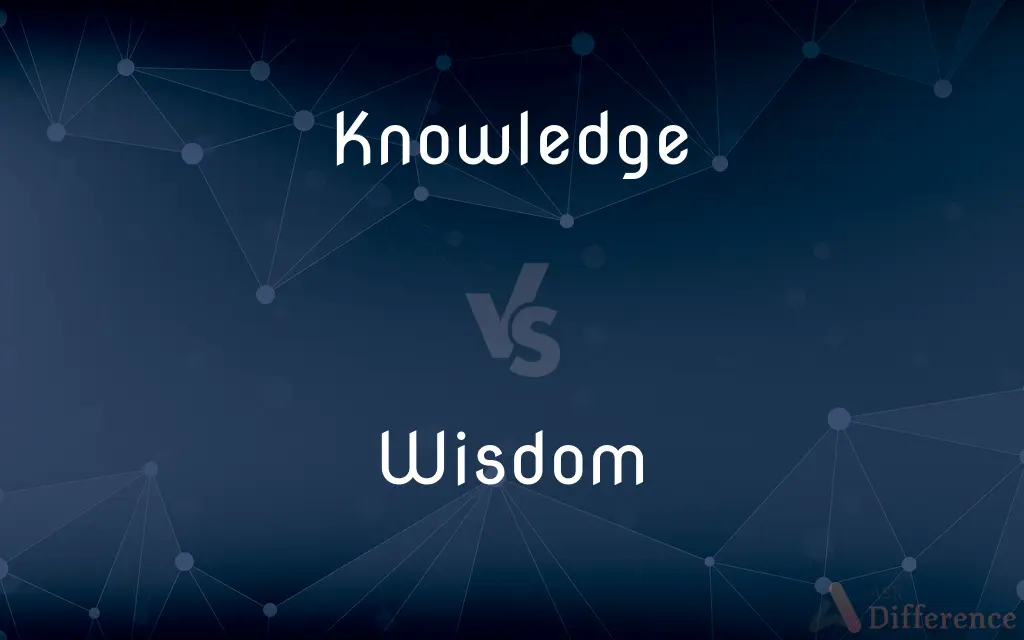Knowledge vs. Wisdom — What's the Difference?
By Tayyaba Rehman & Fiza Rafique — Updated on March 15, 2024
Knowledge is the collection of facts and information, while wisdom is the judicious application of knowledge.

Difference Between Knowledge and Wisdom
Table of Contents
ADVERTISEMENT
Key Differences
Knowledge refers to the accumulation of facts, information, and skills acquired through experience or education. It's about understanding a range of subjects or deep insights into a specific field. Whereas, wisdom involves the prudent use of knowledge through insights, judgment, and experiences to make sound decisions. It's not just what you know, but how you use what you know.
While knowledge can be quantified and is often explicit, wisdom is harder to measure and inherently tacit. Knowledge is knowing that a tomato is a fruit; wisdom is not putting it in a fruit salad. Wisdom encapsulates ethics, values, and the ability to see the bigger picture beyond the facts at hand, guiding actions and decisions with moral and ethical insights.
The acquisition of knowledge is a foundational step towards developing wisdom. It involves learning, memorization, and being informed about facts, theories, and principles. Wisdom, on the other hand, emerges from the application of this knowledge in real-world scenarios, learning from outcomes, reflecting on experiences, and integrating these learnings into future actions.
Knowledge can be transferred from one person to another or acquired from books and educational resources. Wisdom, however, is deeply personal and often developed over a long time through lived experiences, trials, errors, successes, and personal reflection. It's about applying knowledge in the most beneficial way.
In essence, knowledge and wisdom are complementary. Knowledge equips an individual with the necessary tools and information, while wisdom enables the application of these tools in life’s varied and often complex situations. The relationship between the two is dynamic, where increased knowledge can lead to greater wisdom, and the application of wisdom can foster a deeper understanding and further knowledge.
ADVERTISEMENT
Comparison Chart
Definition
Accumulation of facts, information, and skills
Judicious application of knowledge
Nature
Quantifiable and explicit
Tacit and often hard to quantify
Example
Knowing how to perform CPR
Deciding when it’s appropriate to perform CPR
Source
Education, reading, observation
Life experiences, reflection, moral understanding
Application
Often theoretical or informational
Practical, ethical, and moral decision-making
Compare with Definitions
Knowledge
Awareness or familiarity gained by experience of a fact or situation.
The program tests your general knowledge.
Wisdom
Insightful understanding and deep understanding typically offering life guidance.
His books are filled with words of wisdom.
Knowledge
The sum of what is known.
The knowledge contained in the encyclopedia is vast.
Wisdom
The ability to discern or judge what is true, right, or lasting.
Choosing to listen was a moment of wisdom.
Knowledge
Information held on a particular subject or field.
His knowledge of the software made the training easier.
Wisdom
The quality of having experience, knowledge, and good judgment.
The elder's wisdom was respected in the village.
Knowledge
The fact or condition of knowing something with familiarity gained through experience or association.
His knowledge of world history is impressive.
Wisdom
The soundness of an action or decision with regard to the application of experience, knowledge, and good judgment.
She showed great wisdom in her handling of the crisis.
Knowledge
The theoretical or practical understanding of a subject.
She has a thorough knowledge of the subject.
Wisdom
The body of knowledge and principles that develops within a specified society or period.
Ancient wisdom has influenced modern thought.
Knowledge
Knowledge is a familiarity, awareness, or understanding of someone or something, such as facts (descriptive knowledge), skills (procedural knowledge), or objects (acquaintance knowledge). By most accounts, knowledge can be acquired in many different ways and from many sources, including but not limited to perception, reason, memory, testimony, scientific inquiry, education, and practice.
Wisdom
Wisdom, sapience, or sagacity is the ability to think and act using knowledge, experience, understanding, common sense and insight. Wisdom is associated with attributes such as unbiased judgment, compassion, experiential self-knowledge, self-transcendence and non-attachment, and virtues such as ethics and benevolence.Wisdom has been defined in many different ways, including several distinct approaches to assess the characteristics attributed to wisdom.
Knowledge
Facts, information, and skills acquired through experience or education; the theoretical or practical understanding of a subject
A thirst for knowledge
Her considerable knowledge of antiques
Wisdom
The ability to discern or judge what is true, right, or lasting; insight.
Knowledge
Awareness or familiarity gained by experience of a fact or situation
The programme had been developed without his knowledge
He denied all knowledge of the incidents
Wisdom
Common sense; good judgment
"It is a characteristic of wisdom not to do desperate things" (Henry David Thoreau).
Knowledge
The state or fact of knowing
Humans naturally aspire to knowledge.
Wisdom
The sum of learning through the ages; knowledge
"In those homely sayings was couched the collective wisdom of generations" (Maya Angelou).
Knowledge
Familiarity, awareness, or understanding gained through experience or study
Has great knowledge of these parts.
Has only limited knowledge of chemistry.
Wisdom
Wise teachings of the ancient sages.
Knowledge
The sum or range of what has been perceived, discovered, or learned
The extraordinary knowledge housed in the library.
Wisdom
A wise outlook, plan, or course of action.
Knowledge
(Archaic) Carnal knowledge.
Wisdom
Wisdom(Bible) Wisdom of Solomon.
Knowledge
The fact of knowing about something; general understanding or familiarity with a subject, place, situation etc.
His knowledge of Iceland was limited to what he'd seen on the Travel Channel.
Wisdom
(uncountable) An element of personal character that enables one to distinguish the wise from the unwise.
Knowledge
Awareness of a particular fact or situation; a state of having been informed or made aware of something.
Wisdom
(countable) A piece of wise advice.
Knowledge
Intellectual understanding; the state of appreciating truth or information.
Knowledge consists in recognizing the difference between good and bad decisions.
Wisdom
The discretionary use of knowledge for the greatest good.
Knowledge
Familiarity or understanding of a particular skill, branch of learning etc.
Does your friend have any knowledge of hieroglyphs, perchance?
A secretary should have a good knowledge of shorthand.
Wisdom
The ability to apply relevant knowledge in an insightful way, especially to different situations from that in which the knowledge was gained.
Knowledge
(philosophical) Justified true belief
Wisdom
The ability to make a decision based on the combination of knowledge, experience, and intuitive understanding.
Knowledge
(obsolete) Information or intelligence about something; notice.
Wisdom
(theology) The ability to know and apply spiritual truths.
Knowledge
The total of what is known; all information and products of learning.
His library contained the accumulated knowledge of the Greeks and Romans.
Wisdom
(rare) A group of wombats.
Knowledge
(countable) Something that can be known; a branch of learning; a piece of information; a science.
Wisdom
(rare) A group of owls.
Knowledge
(obsolete) Acknowledgement.
Wisdom
The quality of being wise; knowledge, and the capacity to make due use of it; knowledge of the best ends and the best means; discernment and judgment; discretion; sagacity; skill; dexterity.
We speak also not in wise words of man's wisdom, but in the doctrine of the spirit.
Behold, the fear of the Lord, that is wisdom; and to depart from evil is understanding.
It is hoped that our rulers will act with dignity and wisdom that they will yield everything to reason, and refuse everything to force.
Common sense in an uncommon degree is what the world calls wisdom.
Knowledge
(obsolete) Notice, awareness.
Wisdom
The results of wise judgments; scientific or practical truth; acquired knowledge; erudition.
Moses was learned in all the wisdom of the Egyptians, and was mighty in words and in deeds.
Knowledge and wisdom, far from being one,Have ofttimes no connection. Knowledge dwellsIn heads replete with thoughts of other men;Wisdom, in minds attentive to their own.Knowledge, a rude, unprofitable mass,The mere materials with which wisdom builds,Till smoothed, and squared, and fitted to its place,Does but encumber whom it seems to enrich.Knowledge is proud that he has learned so much;Wisdom is humble that he knows no more.
Knowledge
The deep familiarity with certain routes and places of interest required by taxicab drivers working in London, England.
Wisdom
Accumulated knowledge or erudition or enlightenment
Knowledge
(obsolete) To confess as true; to acknowledge.
Wisdom
The trait of utilizing knowledge and experience with common sense and insight
Knowledge
The act or state of knowing; clear perception of fact, truth, or duty; certain apprehension; familiar cognizance; cognition.
Knowledge, which is the highest degree of the speculative faculties, consists in the perception of the truth of affirmative or negative propositions.
Wisdom
Ability to apply knowledge or experience or understanding or common sense and insight
Knowledge
That which is or may be known; the object of an act of knowing; a cognition; - chiefly used in the plural.
There is a great difference in the delivery of the mathematics, which are the most abstracted of knowledges.
Knowledges is a term in frequent use by Bacon, and, though now obsolete, should be revived, as without it we are compelled to borrow "cognitions" to express its import.
To use a word of Bacon's, now unfortunately obsolete, we must determine the relative value of knowledges.
Wisdom
The quality of being prudent and sensible
Knowledge
That which is gained and preserved by knowing; instruction; acquaintance; enlightenment; learning; scholarship; erudition.
Knowledge puffeth up, but charity edifieth.
Ignorance is the curse of God;Knowledge, the wing wherewith we fly to heaven.
Wisdom
An Apocryphal book consisting mainly of a meditation on wisdom; although ascribed to Solomon it was probably written in the first century BC
Knowledge
That familiarity which is gained by actual experience; practical skill; as, a knowledge of life.
Shipmen that had knowledge of the sea.
Knowledge
Scope of information; cognizance; notice; as, it has not come to my knowledge.
Why have I found grace in thine eyes, that thou shouldst take knowledge of me?
Knowledge
To acknowledge.
Knowledge
The psychological result of perception and learning and reasoning
Common Curiosities
What is wisdom?
Wisdom is the ability to apply knowledge, experience, understanding, and insight to make sound decisions.
How does one acquire wisdom?
Through the thoughtful application of knowledge, personal reflection, and learning from life’s experiences.
Can knowledge exist without wisdom?
Yes, one can have knowledge without wisdom, but knowledge is often a precursor to developing wisdom.
Why is wisdom considered more valuable than knowledge?
Because wisdom involves the application of knowledge in an insightful and ethical manner, leading to better decision-making.
Can knowledge be taught?
Yes, knowledge can be taught and shared through educational methods.
How does one acquire knowledge?
Through education, reading, observation, and experiences.
Can wisdom exist without knowledge?
Wisdom inherently requires some form of knowledge to apply, though it extends beyond mere facts to understanding and judgment.
Is knowledge the same as information?
Knowledge goes beyond mere information; it includes understanding and the capacity to utilize information effectively.
What is knowledge?
Knowledge is the collection of facts, information, and skills acquired through experience or education.
Is wisdom age-dependent?
Not necessarily, though it often grows with experiences that tend to accumulate with age.
How is wisdom expressed?
Through actions, decisions, advice, and sometimes restraint, reflecting deep understanding and moral integrity.
Can wisdom be taught?
While wisdom itself cannot be directly taught, environments that stimulate reflection and learning from experiences can foster its development.
How do knowledge and wisdom interact?
Knowledge provides the foundation for wisdom, which in turn uses that foundation to make informed and ethical decisions.
Can wisdom change over time?
Yes, as one gains more experiences and reflects on them, their wisdom can deepen and evolve.
Why do societies value wisdom?
Because it leads to actions and decisions that are considered just, ethical, and beneficial for the community and individuals alike.
Share Your Discovery

Previous Comparison
Anty vs. Ant
Next Comparison
Hub vs. SwitchAuthor Spotlight
Written by
Tayyaba RehmanTayyaba Rehman is a distinguished writer, currently serving as a primary contributor to askdifference.com. As a researcher in semantics and etymology, Tayyaba's passion for the complexity of languages and their distinctions has found a perfect home on the platform. Tayyaba delves into the intricacies of language, distinguishing between commonly confused words and phrases, thereby providing clarity for readers worldwide.
Co-written by
Fiza RafiqueFiza Rafique is a skilled content writer at AskDifference.com, where she meticulously refines and enhances written pieces. Drawing from her vast editorial expertise, Fiza ensures clarity, accuracy, and precision in every article. Passionate about language, she continually seeks to elevate the quality of content for readers worldwide.














































